Abstract
The cytotoxic activity of 6-mercaptopurine (6-MP) is affected by thiopurine methyltransferase (TPMT), a genetically regulated and variable intracellular enzyme. 6-Thioguanine (6-TG), a closely related thiopurine, is less affected by that enzyme and so it may be a more reliable drug-at least for patients with constitutionally high TPMT activity. We attempted to assess its suitability as an alternative by comparing the pharmacokinetics of both drugs in a small group of children with lymphoblastic leukaemia (ALL). Patients were included who were in their second or subsequent remission, who would otherwise have received 6-MP, and on whom pharmacokinetic data concerning 6-MP metabolism had been collected in a previous remission. Plasma 6-TG concentrations were assayed following an oral dose of 40 mg m-2, and the accumulation and fluctuation of intracellular (erythrocyte, RBC) 6-TG nucleotides (6-TGNs) were measured at regular intervals during daily oral therapy. Seven children were studied. Plasma 6-TG concentrations were low and cleared within 6 h of oral dosing. At 7 days, 6-TGN concentrations ranged from 959 to 2361 pmol 8 x 10(-8) RBCs, in all cases significantly higher (P = 0.002) than those produced by the same patients on 6-MP. After a total therapy time of 35 patient months, a modest rise of alanine aminotransferase was seen on one occasion, otherwise no toxicity apart from myelosuppression was encountered. In the context used, 6-TG appears well tolerated and produces higher concentrations of intracellular cytotoxic metabolites than 6-MP. For children constitutionally 'resistant' to the traditional drug, if not all, it may be a preferable alternative.
Full text
PDF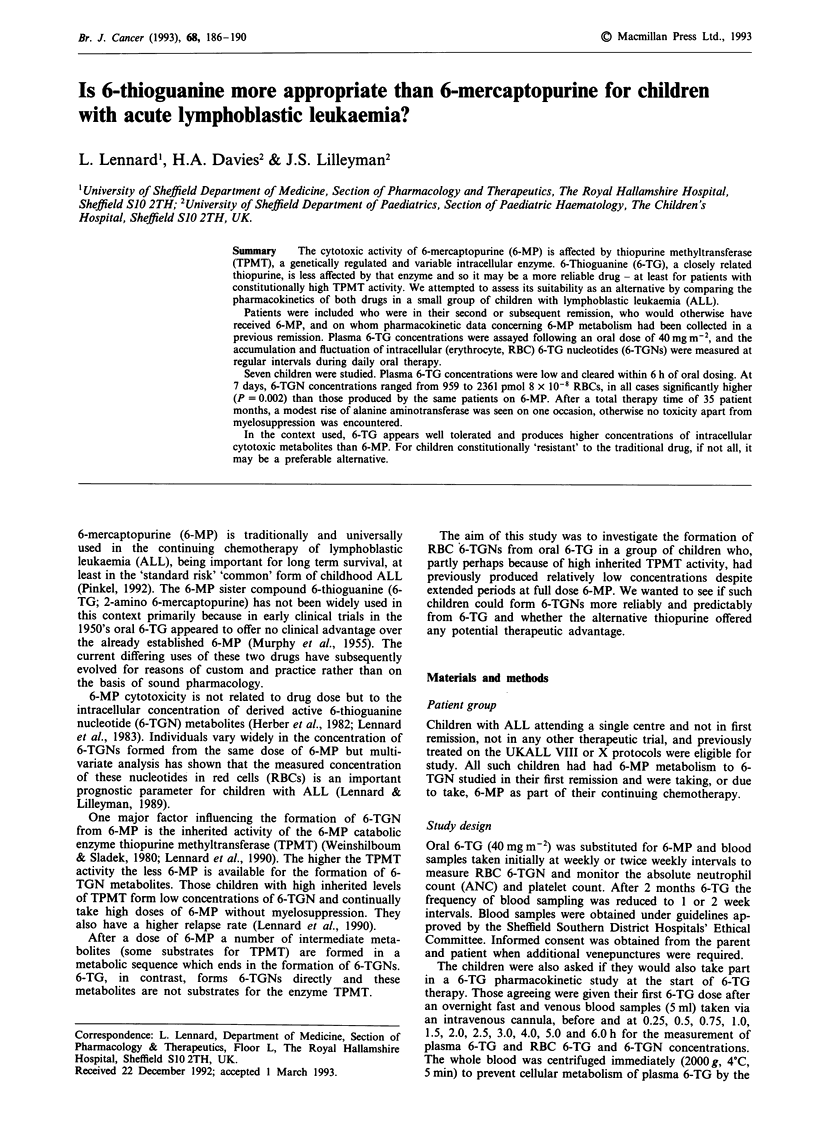
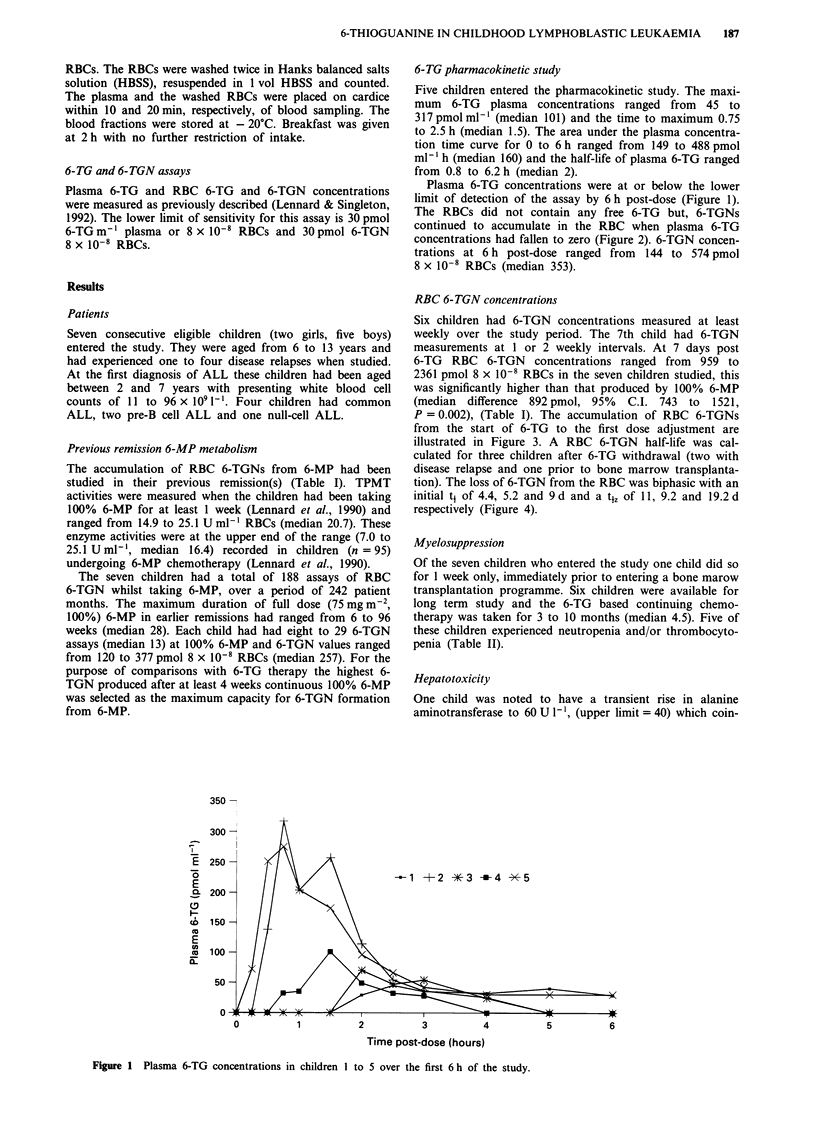
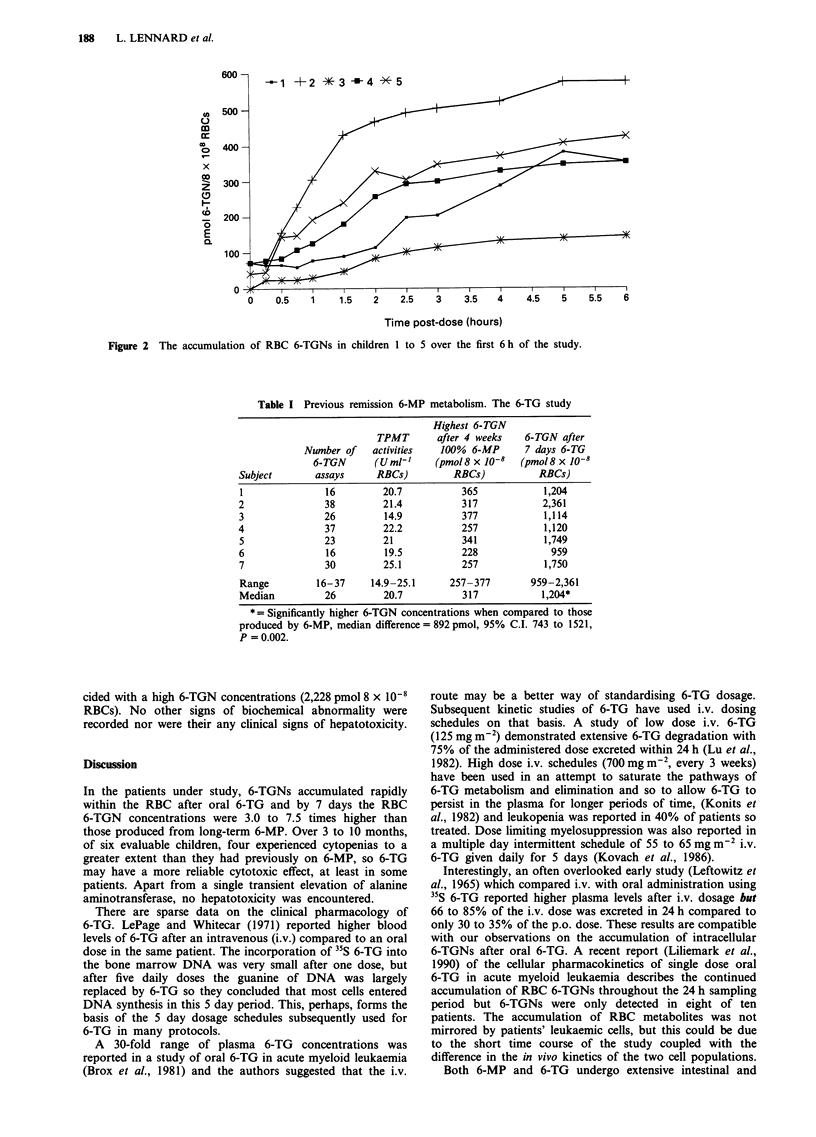
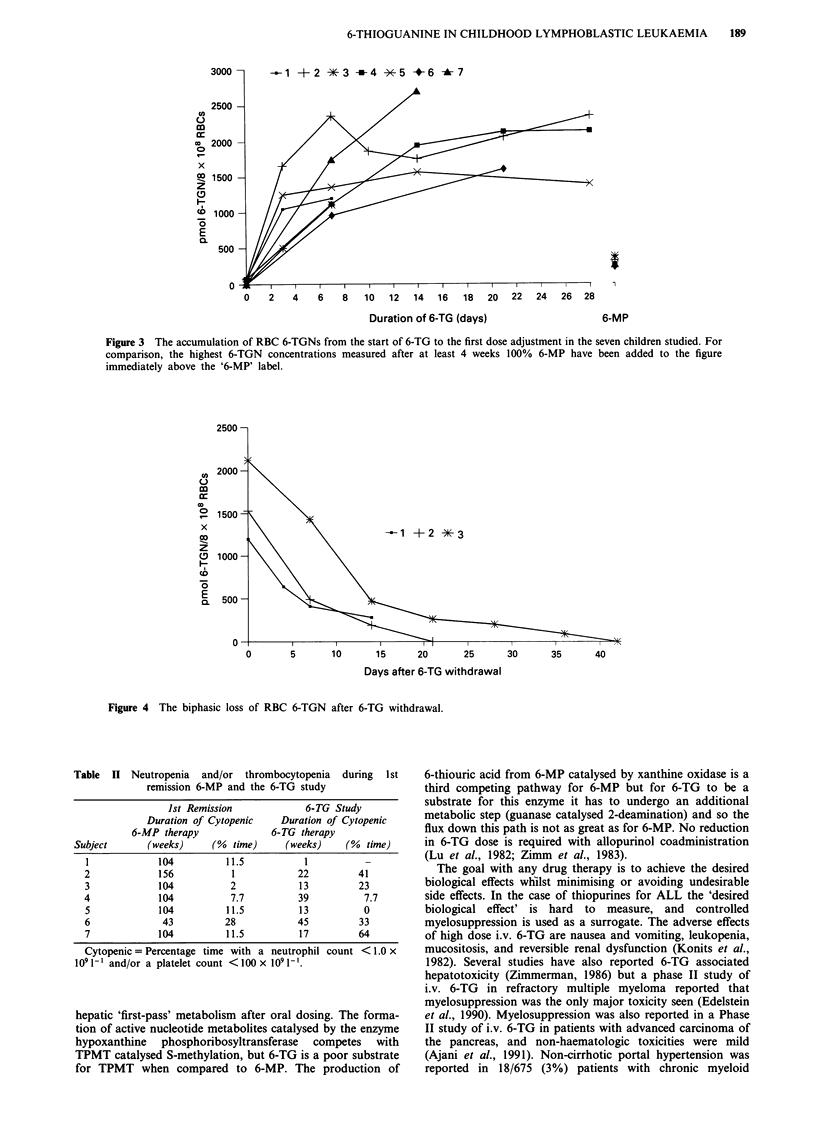
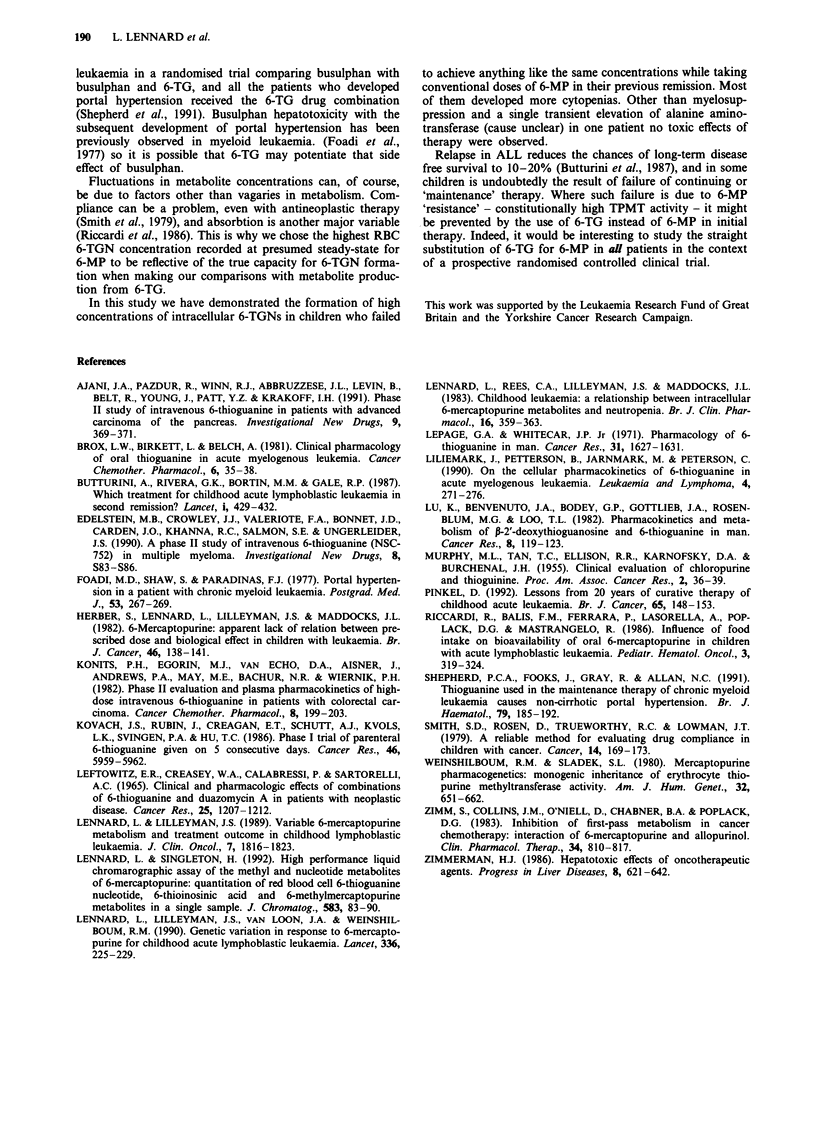
Selected References
These references are in PubMed. This may not be the complete list of references from this article.
- Ajani J. A., Pazdur R., Winn R. J., Abbruzzese J. L., Levin B., Belt R., Young J., Patt Y. Z., Krakoff I. H. Phase II study of intravenous 6-thioguanine in patients with advanced carcinoma of the pancreas. Invest New Drugs. 1991 Nov;9(4):369–371. doi: 10.1007/BF00183584. [DOI] [PubMed] [Google Scholar]
- Brox L. W., Birkett L., Belch A. Clinical pharmacology of oral thioguanine in acute myelogenous leukemia. Cancer Chemother Pharmacol. 1981;6(1):35–38. doi: 10.1007/BF00253008. [DOI] [PubMed] [Google Scholar]
- Butturini A., Rivera G. K., Bortin M. M., Gale R. P. Which treatment for childhood acute lymphoblastic leukaemia in second remission? Lancet. 1987 Feb 21;1(8530):429–432. doi: 10.1016/s0140-6736(87)90128-0. [DOI] [PubMed] [Google Scholar]
- Edelstein M. B., Crowley J. J., Valeriote F. A., Bonnet J. D., Carden J. O., Khanna R. C., Salmon S. E., Ungerleider J. S. A-phase II study of intravenous 6-thioguanine (NSC-752) in multiple myeloma. A Southwest Oncology Group study. Invest New Drugs. 1990;8 (Suppl 1):S83–S86. doi: 10.1007/BF00171990. [DOI] [PubMed] [Google Scholar]
- Foadi M. D., Shaw S., Paradinas F. J. Portal hypertension in a patient with chronic myeloid leukaemia. Postgrad Med J. 1977 May;53(619):267–269. doi: 10.1136/pgmj.53.619.267. [DOI] [PMC free article] [PubMed] [Google Scholar]
- Herber S., Lennard L., Lilleyman J. S., Maddocks J. 6-Mercaptopurine: apparent lack of relation between prescribed dose and biological effect in children with leukaemia. Br J Cancer. 1982 Jul;46(1):138–141. doi: 10.1038/bjc.1982.175. [DOI] [PMC free article] [PubMed] [Google Scholar]
- Konits P. H., Egorin M. J., Van Echo D. A., Aisner J., Andrews P. A., May M. E., Bachur N. R., Wiernik P. H. Phase II evaluation and plasma pharmacokinetics of high-dose intravenous 6-thioguanine in patients with colorectal carcinoma. Cancer Chemother Pharmacol. 1982;8(2):199–203. doi: 10.1007/BF00255484. [DOI] [PubMed] [Google Scholar]
- Kovach J. S., Rubin J., Creagan E. T., Schutt A. J., Kvols L. K., Svingen P. A., Hu T. C. Phase I trial of parenteral 6-thioguanine given on 5 consecutive days. Cancer Res. 1986 Nov;46(11):5959–5962. [PubMed] [Google Scholar]
- LePage G. A., Whitecar J. P., Jr Pharmacology of 6-thioguanine in man. Cancer Res. 1971 Nov;31(11):1627–1631. [PubMed] [Google Scholar]
- Lefkowitz E. R., Creasey W. A., Calabresi P., Sartorelli A. C. Clinical and pharmacologic effects of combinations of 6-thioguanine and duazomycin A in patients with neoplastic disease. Cancer Res. 1965 Sep;25(8):1207–1212. [PubMed] [Google Scholar]
- Lennard L., Lilleyman J. S., Van Loon J., Weinshilboum R. M. Genetic variation in response to 6-mercaptopurine for childhood acute lymphoblastic leukaemia. Lancet. 1990 Jul 28;336(8709):225–229. doi: 10.1016/0140-6736(90)91745-v. [DOI] [PubMed] [Google Scholar]
- Lennard L., Lilleyman J. S. Variable mercaptopurine metabolism and treatment outcome in childhood lymphoblastic leukemia. J Clin Oncol. 1989 Dec;7(12):1816–1823. doi: 10.1200/JCO.1989.7.12.1816. [DOI] [PubMed] [Google Scholar]
- Lennard L., Rees C. A., Lilleyman J. S., Maddocks J. L. Childhood leukaemia: a relationship between intracellular 6-mercaptopurine metabolites and neutropenia. Br J Clin Pharmacol. 1983 Oct;16(4):359–363. doi: 10.1111/j.1365-2125.1983.tb02178.x. [DOI] [PMC free article] [PubMed] [Google Scholar]
- Lennard L., Singleton H. J. High-performance liquid chromatographic assay of the methyl and nucleotide metabolites of 6-mercaptopurine: quantitation of red blood cell 6-thioguanine nucleotide, 6-thioinosinic acid and 6-methylmercaptopurine metabolites in a single sample. J Chromatogr. 1992 Nov 27;583(1):83–90. doi: 10.1016/0378-4347(92)80347-s. [DOI] [PubMed] [Google Scholar]
- Lu K., Benvenuto J. A., Bodey G. P., Gottlieb J. A., Rosenblum M. G., Loo T. L. Pharmacokinetics and metabolism of beta-2'-deoxythioguanosine and 6-thioguanine in man. Cancer Chemother Pharmacol. 1982;8(1):119–123. doi: 10.1007/BF00292882. [DOI] [PubMed] [Google Scholar]
- Pinkel D. Lessons from 20 years of curative therapy of childhood acute leukaemia. Br J Cancer. 1992 Feb;65(2):148–153. doi: 10.1038/bjc.1992.32. [DOI] [PMC free article] [PubMed] [Google Scholar]
- Riccardi R., Balis F. M., Ferrara P., Lasorella A., Poplack D. G., Mastrangelo R. Influence of food intake on bioavailability of oral 6-mercaptopurine in children with acute lymphoblastic leukemia. Pediatr Hematol Oncol. 1986;3(4):319–324. doi: 10.3109/08880018609031233. [DOI] [PubMed] [Google Scholar]
- Shepherd P. C., Fooks J., Gray R., Allan N. C. Thioguanine used in maintenance therapy of chronic myeloid leukaemia causes non-cirrhotic portal hypertension. Results from MRC CML. II. Trial comparing busulphan with busulphan and thioguanine. Br J Haematol. 1991 Oct;79(2):185–192. doi: 10.1111/j.1365-2141.1991.tb04520.x. [DOI] [PubMed] [Google Scholar]
- Smith S. D., Rosen D., Trueworthy R. C., Lowman J. T. A reliable method for evaluating drug compliance in children with cancer. Cancer. 1979 Jan;43(1):169–173. doi: 10.1002/1097-0142(197901)43:1<169::aid-cncr2820430125>3.0.co;2-f. [DOI] [PubMed] [Google Scholar]
- Weinshilboum R. M., Sladek S. L. Mercaptopurine pharmacogenetics: monogenic inheritance of erythrocyte thiopurine methyltransferase activity. Am J Hum Genet. 1980 Sep;32(5):651–662. [PMC free article] [PubMed] [Google Scholar]
- Zimm S., Collins J. M., O'Neill D., Chabner B. A., Poplack D. G. Inhibition of first-pass metabolism in cancer chemotherapy: interaction of 6-mercaptopurine and allopurinol. Clin Pharmacol Ther. 1983 Dec;34(6):810–817. doi: 10.1038/clpt.1983.254. [DOI] [PubMed] [Google Scholar]
- Zimmerman H. J. Hepatotoxic effects of oncotherapeutic agents. Prog Liver Dis. 1986;8:621–642. [PubMed] [Google Scholar]



